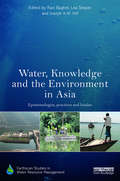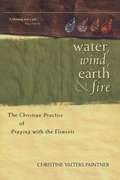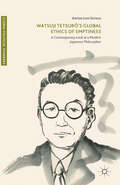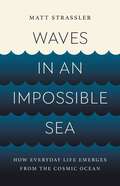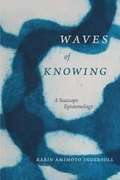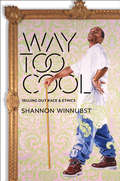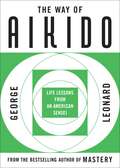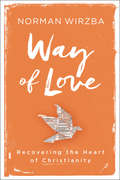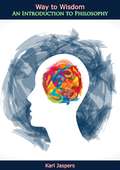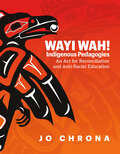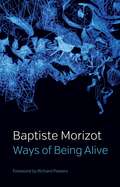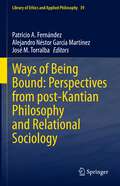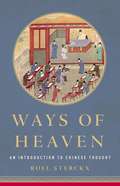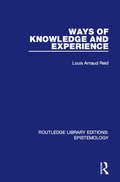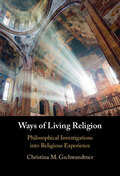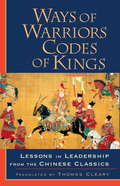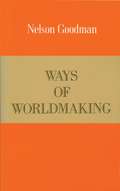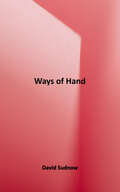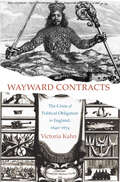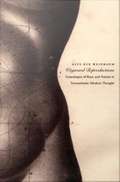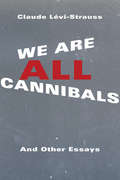- Table View
- List View
Water, Knowledge and the Environment in Asia: Epistemologies, Practices and Locales (Earthscan Studies in Water Resource Management)
by Ravi Baghel Lea Stepan Joseph K.W. HillThe dramatic transformation of our planet by human actions has been heralded as the coming of the new epoch of the Anthropocene. Human relations with water raise some of the most urgent questions in this regard. The starting point of this book is that these changes should not be seen as the result of monolithic actions of an undifferentiated humanity, but as emerging from diverse ways of relating to water in a variety of settings and knowledge systems. With its large population and rapid demographic and socioeconomic change, Asia provides an ideal context for examining how varied forms of knowledge pertaining to water encounter and intermingle with one another. While it is difficult to carry out comprehensive research on water knowledge in Asia due to its linguistic, political and cultural fragmentation, the topic nevertheless has relevance across boundaries. By using a carefully chosen selection of case studies in a variety of locations and across diverse disciplines, the book demonstrates commonalities and differences in everyday water practices around Asia while challenging both romantic presumptions and Eurocentrism. Examples presented include class differences in water use in the megacity of Delhi, India; the impact of radiation on water practices in Fukushima, Japan; the role of the King in hydraulic practices in Thailand, and ritual irrigation in Bali, Indonesia.
Water, Wind, Earth, and Fire: The Christian Practice of Praying with the Elements
by Valters Christine PaintnerOrganized around The Canticle of the Creatures by St. Francis of Assisi, Water, Wind, Earth, and Fire is the first book to consider the ways in which praying with the natural elements can enliven Christian spiritual life. Paintner offers concrete suggestions and guided contemplative exercises; for instance, she suggests that readers take time to ¿watch the sunrise or sunset and breathe in the beauty of the fiery sky. Contemplate what those beginnings and endings have to say in your own life. ¿ Readers benefit from Paintner¿s extensive training in theology and Benedictine spirituality, as well as her unique work in bringing the expressive arts to spiritual direction.
Watsuji Tetsurô’s Global Ethics of Emptiness
by Anton Luis SevillaThis book is a rethinking of ethics and socio-political life through the ideas of Watsuji Tetsurô. Can we build a systematic philosophy of morality, society, and politics, not on the basis of identity and ego, but rather on the basis of selflessness? This book explores such an attempt by the leading ethicist of modern Japan. Using concrete examples and contemporary comparisons, and with careful reference to both English and Japanese sources, it guides the reader through Watsuji’s ideas. It engages three contemporary issues in depth: First, how do we approach the moral agent, as an autonomous being or as a fundamentally relational being? Second, is it the individual or the community that is the starting point for politics? And finally, is ethics something that is globally shared or something fundamentally local? This book aims to be an informative and inspiring resource for researchers, students, and laypersons interested in Buddhist thought.
Waves in an Impossible Sea: How Everyday Life Emerges from the Cosmic Ocean
by Matt StrasslerA theoretical physicist takes readers on an awe-inspiring journey—found in "no other book" (Science)—to discover how the universe generates everything from nothing at all: "If you want to know what's really going on in the realms of relativity and particle physics, read this book" (Sean Carroll, author of The Biggest Ideas in the Universe). In Waves in an Impossible Sea, physicist Matt Strassler tells a startling tale of elementary particles, human experience, and empty space. He begins with a simple mystery of motion. When we drive at highway speeds with the windows down, the wind beats against our faces. Yet our planet hurtles through the cosmos at 150 miles per second, and we feel nothing of it. How can our voyage be so tranquil when, as Einstein discovered, matter warps space, and space deflects matter? The answer, Strassler reveals, is that empty space is a sea, albeit a paradoxically strange one. Much like water and air, it ripples in various ways, and we ourselves, made from its ripples, can move through space as effortlessly as waves crossing an ocean. Deftly weaving together daily experience and fundamental physics—the musical universe, the enigmatic quantum, cosmic fields, and the Higgs boson—Strassler shows us how all things, familiar and unfamiliar, emerge from what seems like nothing at all. Accessible and profound, Waves in an Impossible Sea is the ultimate guide to our place in the universe.
Waves of Knowing: A Seascape Epistemology
by Karin Amimoto IngersollIn Waves of Knowing Karin Amimoto Ingersoll marks a critical turn away from land-based geographies to center the ocean as place. Developing the concept of seascape epistemology, she articulates an indigenous Hawaiian way of knowing founded on a sensorial, intellectual, and embodied literacy of the ocean. As the source from which Kanaka Maoli (Native Hawaiians) draw their essence and identity, the sea is foundational to Kanaka epistemology and ontology. Analyzing oral histories, chants, artwork, poetry, and her experience as a surfer, Ingersoll shows how this connection to the sea has been crucial to resisting two centuries of colonialism, militarism, and tourism. In today's neocolonial context--where continued occupation and surf tourism marginalize indigenous Hawaiians--seascape epistemology as expressed by traditional cultural practices such as surfing, fishing, and navigating provides the tools for generating an alternative indigenous politics and ethics. In relocating Hawaiian identity back to the waves, currents, winds, and clouds, Ingersoll presents a theoretical alternative to land-centric viewpoints that still dominate studies of place-making and indigenous epistemology.
Waves of War: Nationalism, State Formation, and Ethnic Exclusion in the Modern World
by Andreas WimmerWhy did the nation-state emerge and proliferate across the globe? How is this process related to the wars fought in the modern era? Analyzing datasets that cover the entire world over long stretches of time, Andreas Wimmer focuses on changing configurations of power and legitimacy to answer these questions. The nationalist ideal of self-rule gradually diffused over the world and delegitimized empire after empire. Nationalists created nation-states wherever the power configuration favored them, often at the end of prolonged wars of secession. The elites of many of these new states were institutionally too weak for nation-building and favored their own ethnic communities. Ethnic rebels challenged such exclusionary power structures that violated the principle of self-rule, and neighboring governments sometimes intervened into these struggles over the state. Waves of War demonstrates why nation-state formation and ethnic politics are crucial to understand the civil and international wars of the past 200 years.
Way Too Cool
by Shannon WinnubstLife, liberty, and the pursuit of cool have informed the American ethos since at least the 1970s. Whether we strive for it in politics or fashion, cool is big business for those who can sell it across a range of markets and media. Yet the concept wasn't always a popular commodity. Cool began as a potent aesthetic of post-World War II black culture, embodying a very specific, highly charged method of resistance to white supremacy and the globalized exploitation of capital. Way Too Cool follows the hollowing-out of "coolness" in modern American culture and its reflection of a larger evasion of race, racism, and ethics now common in neoliberal society. It revisits such watershed events as the 1960s Civil Rights Movement, second-wave feminism, the emergence of identity politics, 1980s multiculturalism, 1990s rhetorics of diversity and colorblindness, 9/11, and Hurricane Katrina, as well as the contemporaneous developments of rising mass incarceration and legalized same-sex marriage, to pair the perversion of cool with the slow erasure of racial and ethical issues from our social consciousness, which effectively quashes our desire to act ethically and resist abuses of power. The cooler we become, the more indifferent we grow to the question of values, particularly inquiry that spurs protest and conflict. This book sounds an alarm for those who care about preserving our ties to an American tradition of resistance.
Way Too Cool: Selling Out Race and Ethics
by Shannon WinnubstLife, liberty, and the pursuit of cool have informed the American ethos since at least the 1970s. Whether we strive for it in politics or fashion, cool is big business for those who can sell it across a range of markets and media. Yet the concept wasn't always a popular commodity. Cool began as a potent aesthetic of post-World War II black culture, embodying a very specific, highly charged method of resistance to white supremacy and the globalized exploitation of capital.Way Too Cool follows the hollowing-out of "coolness" in modern American culture and its reflection of a larger evasion of race, racism, and ethics now common in neoliberal society. It revisits such watershed events as the 1960s Civil Rights Movement, second-wave feminism, the emergence of identity politics, 1980s multiculturalism, 1990s rhetorics of diversity and colorblindness, 9/11, and Hurricane Katrina, as well as the contemporaneous developments of rising mass incarceration and legalized same-sex marriage. It pairs the perversion of cool with the slow erasure of racial and ethical issues from our social consciousness, which effectively quashes our desire to act ethically and resist abuses of power. The cooler we become, the more indifferent we grow to the question of values, particularly inquiry that spurs protest and conflict. This book sounds an alarm for those who care about preserving our ties to an American tradition of resistance.
Way of Aikido, The: Life Lessons from an American Sensei
by George LeonardAn insightful and inspiring book for the spiritual seeker, "The Way of Aikido" offers a new way of facing life's challenges.
Way of Love: Recovering the Heart of Christianity
by Norman WirzbaThe pioneering scholar and author of Food and Faith and Living the Sabbath asserts that Christianity has slid off its rightful foundation, arguing that the faith only makes sense and can only be expressed in a healthy way if it seen as based on love, with a mission of training others in the way of love.It's often said that God is love, yet his message of compassion and caring for others is often overshadowed by the battles dividing us politically, culturally, and religiously. Why does Christianity matter if it isn't about love? asks Duke University professor of Theology and Ecology Norman Wirzba.The Way of Love invites readers to experience Christianity that is centered on love. Extensive theological training cannot replace the way of love that transforms and connects each of us to God and the faith, Wirzba contends. Interweaving illuminating testimonials, historical references, and Scripture, he reveals how love allows us to move into the fullness of life; when we do not love we lose our faith. "To fail to love," he reminds us, "is to lose God."
Way to Wisdom: An Introduction to Philosophy (Nota Bene Ser.)
by Karl JaspersOne of the founders of existentialism, the eminent philosopher Karl Jaspers here presents for the general reader an introduction to philosophy. In doing so, he also offers a lucid summary of his own philosophical thought. In Jaspers' view, the source of philosophy is to be found "in wonder, in doubt, in a sense of forsakenness," and the philosophical quest is a process of continual change and self-discovery.—Print ed.
Wayi Wah! Indigenous Pedagogies: An Act for Reconciliation and Anti-Racist Education
by Jo Chrona★ Starred selection for CCBC's Best Books Ideal for Teachers 2023!Now a National Best Seller! How can Indigenous knowledge systems inform our teaching practices and enhance education? How do we create an education system that embodies an anti-racist approach and equity for all learners? This powerful and engaging resource is for non-Indigenous educators who want to learn more, are new to these conversations, or want to deepen their learning. Some educators may come to this work with some trepidation. You may feel that you are not equipped to engage in Indigenous education, reconciliation, or anti-racism work. You may be anxious about perpetuating misconceptions or stereotypes, making mistakes, or giving offence. In these chapters, I invite you to take a walk and have a conversation with a good mind and a good heart. With over two decades in Indigenous education, author Jo Chrona encourages readers to acknowledge and challenge assumptions, reflect on their own experiences, and envision a more equitable education system for all. Each chapter includes reflection questions to help process the ideas in each chapter suggestions for taking action in both personal and professional spheres of influence recommended resources to read, watch, or listen to for further learning personal reflections and anecdotes from the author on her own learning journey voices of non-Indigenous educators who share their learning and model how to move into, and sit, in places of unknowing and discomfort, so we can examine our own biases and engage in this work in a good way Grounded in the First Peoples Principles of Learning, this comprehensive guide builds on Chrona&’s own experiences in British Columbia&’s education system to explore how to shape anti-racist and equitable education systems for all. Perfect for reading on your own or with your professional learning community!
Wayi Wah! Indigenous Pedagogies: An Act for Reconciliation and Anti-Racist Education
by Jo Chrona★ Starred selection for CCBC's Best Books Ideal for Teachers 2023!Now a National Best Seller! How can Indigenous knowledge systems inform our teaching practices and enhance education? How do we create an education system that embodies an anti-racist approach and equity for all learners? This powerful and engaging resource is for non-Indigenous educators who want to learn more, are new to these conversations, or want to deepen their learning. Some educators may come to this work with some trepidation. You may feel that you are not equipped to engage in Indigenous education, reconciliation, or anti-racism work. You may be anxious about perpetuating misconceptions or stereotypes, making mistakes, or giving offence. In these chapters, I invite you to take a walk and have a conversation with a good mind and a good heart. With over two decades in Indigenous education, author Jo Chrona encourages readers to acknowledge and challenge assumptions, reflect on their own experiences, and envision a more equitable education system for all. Each chapter includes reflection questions to help process the ideas in each chapter suggestions for taking action in both personal and professional spheres of influence recommended resources to read, watch, or listen to for further learning personal reflections and anecdotes from the author on her own learning journey voices of non-Indigenous educators who share their learning and model how to move into, and sit, in places of unknowing and discomfort, so we can examine our own biases and engage in this work in a good way Grounded in the First Peoples Principles of Learning, this comprehensive guide builds on Chrona&’s own experiences in British Columbia&’s education system to explore how to shape anti-racist and equitable education systems for all. Perfect for reading on your own or with your professional learning community!
Ways of Being Alive
by Baptiste MorizotThe ecological crisis is a very real crisis for the many species that face extinction, but it is also a crisis of sensibility – that is, a crisis in our relationships with other living beings. We have grown accustomed to treating other living beings as the material backdrop for the drama of human life: the animal world is regarded as part of ‘nature’, juxtaposed to the world of human beings who pursue their aims independently of other species.Baptiste Morizot argues that the time has come for us to jettison this nature─human dualism and rethink our relationships with other living beings. Animals are not part of a separate, natural world: they are cohabitants of the Earth, with whom we share a common ancestry, the enigma of being alive and the responsibility of living decent lives together. By accepting our identity as living beings and reconnecting with our own animal nature, we can begin to change our relationships with other animals, seeing them not as inferior lifeforms but as living creatures who have different ways of being alive.This powerful plea for a new understanding of our relationships with other animals will be of great interest to anyone concerned about the ecological crisis and the future of different species, including our own.
Ways of Being Bound: Perspectives from post-Kantian Philosophy and Relational Sociology (Library of Ethics and Applied Philosophy #39)
by Patricio A. Fernández Alejandro Néstor García Martínez José M. TorralbaThis book addresses the topic of 'being bound' from a philosophical and a sociological perspective. It examines several ways in which we are bound. We are bound to acknowledge the truth and to follow laws; we are bound to others and to the world. Who we are is partly defined by those bonds, regardless of whether we live up to them – or even of whether we acknowledge them. Puzzling questions arise from the fact that we are bound, such as: How are those bonds binding? Wherein lies their normative character? A venerable philosophical tradition, particularly since Kant, has provided an account of normativity that crucially appeals to such notions as “self-legislation.” But can our normative bonds be properly understood in these essentially first-personal terms? Many argue that our social condition resists any account of those bonds that fails to acknowledge the perspectives of the second and the third person. The first part of the book explores these themes from a historical perspective in the tradition of transcendental philosophy (Kant, Fichte, Hegel, Husserl and Heidegger); it examines the phenomenon of “being bound”, i.e., why and how we are bound. The second part of the book offers a sociological analysis of social bonds that is both historical and systematic. Based on sociological approaches to “solidarity” and “reflexivity”, it explores the way in which the phenomenon of “being bound” manifests through the concept of a “social relation”.
Ways of Heaven: An Introduction to Chinese Thought
by Roel SterckxA brilliant history of ancient China's masters of philosophy -- and how they help us understand China today In Ways of Heaven, leading China scholar Roel Sterckx offers an engrossing introduction to classical China's world of ideas. Drawing on evocative examples from philosophical texts, literature, and everyday life over centuries of Chinese history, Sterckx introduces major thinkers and traditions, illuminates key concepts like the dao, qi, yin, and yang, and examines questions of leadership, social order, death, nature, and more. He also reveals how these ideas shape contemporary China, from table manners at a traditional banquet, to the Chinese obsession with education and family, to the rhetoric of political leaders and the nation's grand strategy. Essential reading for students, travelers, businesspeople, and anyone curious about this rising global power, Ways of Heaven shows that to comprehend China today we must learn to think Chinese.
Ways of Knowledge and Experience (Routledge Library Editions: Epistemology)
by Louis Arnaud ReidOriginally published in 1961. This book is a study of some important ways of knowledge and experience and of the symbols through which they become articulate. Both ‘knowledge’ and ‘experience’ are interpreted in wide senses which are sanctioned by common use – though not always by the usage of philosophers and scientists. The four main fields considered are: the arts, religion, moral knowledge, and our knowledge of one another. These fields, though distinguishable, are nevertheless found to be interrelated in subtle and interesting ways, and it is contended that increase of ‘wisdom’, or ‘educated understanding’, can be achieved only through acceptance and assimilation of all their many-sided disciplines into personal insight. The book deals in a new way with questions of perennial interest which, because they are fundamental, are difficult. Nevertheless, the writing is lucid and untechnical and addressed to a wide range of readers.
Ways of Living Religion: Philosophical Investigations into Religious Experience
by Christina M. GschwandtnerWays of Living Religion provides a philosophical analysis of different types of religious experience - ascetic, liturgical, monastic, mystical, devotional, compassionate, fundamentalist - that focuses on the lived experience of religion rather than reducing it to mere statements of belief or doctrine. Using phenomenology, Christina M. Gschwandtner distinguishes between different kinds of religious experiences by examining their central characteristics and defining features, as well as showing their continuity with human experience more broadly. The book is the first philosophical examination of several of these types, thus breaking new ground in philosophical thinking about religion. It is neither a confessional treatment nor a reduction of the lived experience to psychological or sociological phenomena. While Gschwandtner's treatment focuses on Christian forms of expression of these different types, it opens the path to broader examinations of ways of living religion that might enable scholars to give a more nuanced account of their similarities and differences.
Ways of Warriors, Codes of Kings: Lessons in Leadership from the Chinese Classics
by Thomas ClearyHere is a concise and user-friendly presentation of the ancient Chinese principles of leadership and strategy in the words of the masters themselves. Thomas Cleary has put together this collection of gems of wisdom from six of the great classics, including excerpts from his best-selling translation of The Art of War and other lesser-known but insightful texts.
Ways of the Hand: The Organization of Improvised Conduct
by David SudnowThis is David Sudnow's classic account of how his hands learned to improvise jazz on the piano. David Sudnow is the author of Passing On and editor of Studies in Social Interaction. Since writing this book, he has developed a piano training method based on its insights.
Wayward Contracts: The Crisis of Political Obligation in England, 1640-1674
by Victoria KahnWhy did the language of contract become the dominant metaphor for the relationship between subject and sovereign in mid-seventeenth-century England? In Wayward Contracts, Victoria Kahn takes issue with the usual explanation for the emergence of contract theory in terms of the origins of liberalism, with its notions of autonomy, liberty, and equality before the law. Drawing on literature as well as political theory, state trials as well as religious debates, Kahn argues that the sudden prominence of contract theory was part of the linguistic turn of early modern culture, when government was imagined in terms of the poetic power to bring new artifacts into existence. But this new power also brought in its wake a tremendous anxiety about the contingency of obligation and the instability of the passions that induce individuals to consent to a sovereign power. In this wide-ranging analysis of the cultural significance of contract theory, the lover and the slave, the tyrant and the regicide, the fool and the liar emerge as some of the central, if wayward, protagonists of the new theory of political obligation. The result is must reading for students and scholars of early modern literature and early modern political theory, as well as historians of political thought and of liberalism.
Wayward Reproductions: Genealogies of Race and Nation in Transatlantic Modern Thought
by Alys Eve WeinbaumWayward Reproductions breaks apart and transfigures prevailing understandings of the interconnection among ideologies of racism, nationalism, and imperialism. Alys Eve Weinbaum demonstrates how these ideologies were founded in large part on what she calls "the race/reproduction bind"--the notion that race is something that is biologically reproduced. In revealing the centrality of ideas about women's reproductive capacity to modernity's intellectual foundations, Weinbaum highlights the role that these ideas have played in naturalizing oppression. She argues that attention to how the race/reproduction bind is perpetuated across national and disciplinary boundaries is a necessary part of efforts to combat racism. Gracefully traversing a wide range of discourses--including literature, evolutionary theory, early anthropology, Marxism, feminism, and psychoanalysis--Weinbaum traces a genealogy of the race/reproduction bind within key intellectual formations of the late nineteenth and twentieth centuries. She examines two major theorists of genealogical thinking--Friedrich Nietzsche and Michel Foucault--and unearths the unacknowledged ways their formulations link race and reproduction. She explores notions of kinship and the replication of racial difference that run through Charlotte Perkins Gilman's work; Marxist thinking based on Friedrich Engel's The Origin of the Family; Charles Darwin's theory of sexual selection; and Sigmund Freud's early studies on hysteria. She also describes W. E. B. Du Bois's efforts to transcend ideas about the reproduction of race that underwrite citizenship and belonging within the United States. In a coda, Weinbaum brings the foregoing analysis to bear on recent genomic and biotechnological innovations.
We All Have Different Abilities
by Melissa HigginsWhat can you do? Tie your shoes? Play piano? Everyone has different talents and abilities. Let's share and celebrate our many talents
We Are All Cannibals: And Other Essays
by Claude Levi-Strauss Jane Marie Todd Maurice OlenderOn Christmas Eve 1951, Santa Claus was hanged and then publicly burned outside of the Cathedral of Dijon in France. That same decade, ethnologists began to study the indigenous cultures of central New Guinea, and found men and women affectionately consuming the flesh of the ones they loved. "Everyone calls what is not their own custom barbarism," said Montaigne. In these essays, Claude Lévi-Strauss shows us behavior that is bizarre, shocking, and even revolting to outsiders but consistent with a people's culture and context.These essays relate meat eating to cannibalism, female circumcision to medically assisted reproduction, and mythic thought to scientific thought. They explore practices of incest and patriarchy, nature worship versus man-made material obsessions, the perceived threat of art in various cultures, and the innovations and limitations of secular thought. Lévi-Strauss measures the short distance between "complex" and "primitive" societies and finds a shared madness in the ways we enact myth, ritual, and custom. Yet he also locates a pure and persistent ethics that connects the center of Western civilization to far-flung societies and forces a reckoning with outmoded ideas of morality and reason.
